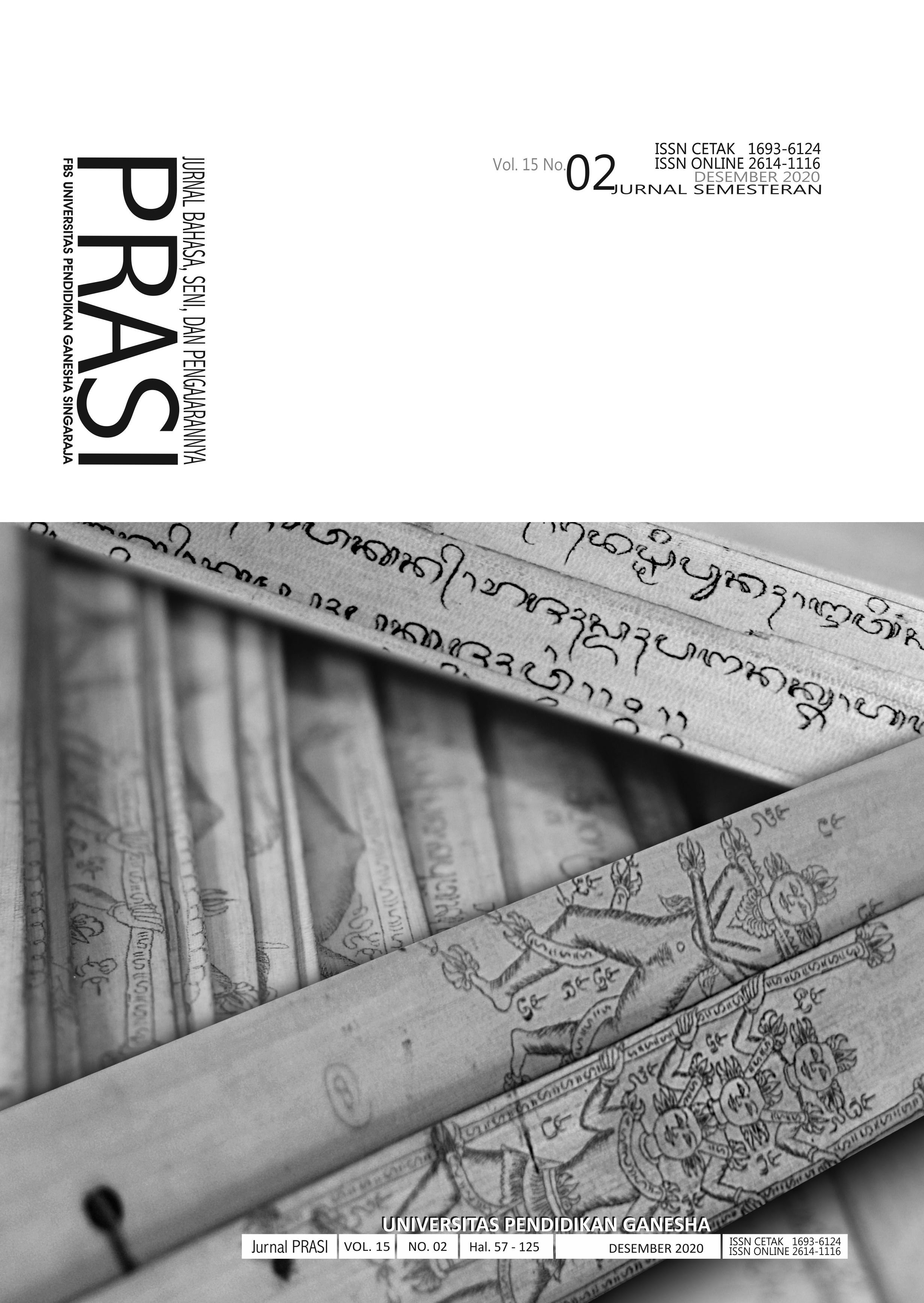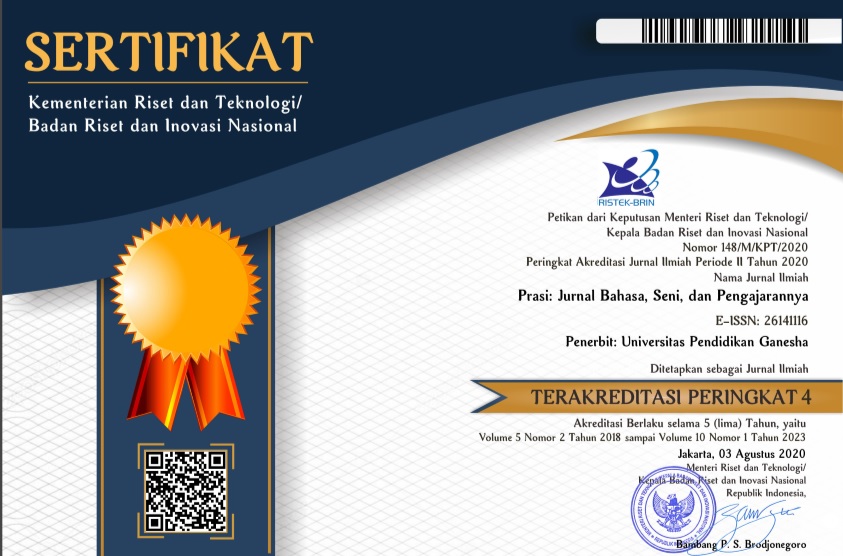ENGLISH TEACHERS’ PERCEPTIONS AND IMPLEMENTATION OF PEDAGOGICAL CONTENT KNOWLEDGE IN TEACHING ENGLISH TO YOUNG LEARNERS
DOI:
https://doi.org/10.23887/prasi.v15i02.28161Keywords:
Pedagogical Content Knowledge, Teachers’ perceptions, Primary SchoolAbstract
This study aimed at investigating primary English teachers’ perceptions and implementation of Pedagogical Content Knowledge in teaching English to young learners, and the consistency between the teachers’ perceptions and implementation of PCK in teaching English to young learners. This study involved three English teachers from three different primary schools in Buleleng regency which were selected by using Convenience sampling technique. The research design was embedded QUAL-quan mixed method. The instruments used to collect the data were questionnaire, observation sheet, and interview guide. The data were analyzed by using descriptive qualitative. The study demonstrated that teachers had high perceptions of PCK. However, their PCK implementation was very low. Thus, there is no consistency between the perceptions and implementation of PCK. Moreover, based on the result of the interview, the teachers encountered some problems included difficulty in using English in speaking and writing, designing learning activities to facilitate students’ characteristics, choosing media that related to the material, and providing learning media due to lack of facility in the school. Therefore, schools administrators need to promote English teachers’ improvement of pedagogical content knowledge by proposing them to participate in the certain professional development program.References
Agustini, N. W. W., Artini, L. P., & Padmadewi, N. N. (2019). English Teachers’ Perceptions and Classroom Practices On Constructivism Values in Primary Schools in Badung Regency, 7(2), 1–11. https://doi.org/DOI: 10.23887/jpbi.v7i2.2722
Aini, W. N. 2013. Instructional Media in Teaching English to Young Learners: A Case Study in Elementary Schools in Kuningan, (1972), 196–205. Retrieved from https://ejournal.upi.edu/index.php/L-E/article/view/350
Andrews, S. (2001). The Language Awareness of the L2 Teacher : Its Impact Upon Pedagogical Practice. https://doi.org/10.1080/09658410108667027
Artini, L. P. (2017). Rich Language Learning Environment And Young Learners ’ Literacy Skills In English, 11(May), 19–24. https://doi.org/10.21512/lc.v11i1.1587
Çakir, İ. (2004). Designing Activities Classrooms for Young Learners in EFL Classroom, 3, 101–112. Retrieved from http://www.gefad.gazi.edu.tr/tr/download/article-file/77293
Canh, L. Van, & Renandya, W. A. (2017). Teachers’ English Proficiency and Classroom Language Use: A Conversation Analysis Study. RELC Journal, 48(1), 67–81. https://doi.org/10.1177/0033688217690935
Creswell, J.W. (2012). Educational Research Planning, Conducting, and Evaluating Quantitative and Qualitative Research. Fourth Edition. USA: Pearson Education, Inc.
Faisal, F. (2015). Pedagogical Content Knowledge in English Language Teaching in Indonesia (a preliminary analysis), (November 2014). Retrieved from https://digilib.ump.ac.id/files/disk1/23/jhptump-ump-gdl-faisal-1116-1-faisal.pdf
Ghasemi, B., & Hashemi, M. (2011). Foreign language learning during childhood. Procedia - Social and Behavioral Sciences, 28, 872–876. https://doi.org/10.1016/j.sbspro.2011.11.160
Habibi, A., & Sofwan, M. (2015). Teachers of English for Young Learners : An Analysis on Their English Proficiency and Profile. Retrieved from https://www.researchgate.net/publication/324184294%0ATeachers
Juhana. (2014). Teaching English to Young Learners : Some Points to be Considered, 02(01), 43–46. Retrieved from https://www.ajouronline.com/index.php/AJEEL/article/view/575
Listyariani, N. P. R., Artini, L. P., & Padmadewi, N. N. (2018). Teachers ’ Perceptions Of Teaching English For Young Learners And The Implementation In Public Primary Schools In Jembrana Sub-District. Jurnal Pendidikan Bahasa Inggris Indonesia, 6(2), 1–10. https://doi.org/https://doi.org/10.23887/jpbi.v6i2.2710
Magnusson, S., Krajcik, J., & Borko, H. (1999). Nature , Sources , and Development of Pedagogical Content Knowledge for Science Teaching, (May 2014). https://doi.org/10.1007/0-306-47217-1
Mahardhika, P. (2014). English Teaching Media In Class Implementing Curriculum 2013, (68), 177–180. Retrieved from 172694-EN-english-teaching-media-in-class-implements.pdf
Medwell, J., Wray, D., Minns, H., Griffiths, V., & Coates, E. (2009). Primary English: Teaching Theory and Practice Fourth edition (4 edition). Learning Matters Ltd.
Musthafa, B. (2010). Teaching English to Young Learners in Indonesia : Essential Requirements, IV(2), 120–125. Retrieved from 5501436b8e67d956a31cf8303f520eeea7d4.pdf
Ostovar-Namaghi, S. A., & Norouzi, S. (2015). First Language Use in Teaching a Foreign Language: Theoretical Perspectives and Empirical Findings. US-China Foreign Language, 13(9), 615–622. https://doi.org/10.17265/1539-8080/2015.09.001
Padmadewi, N. N., Nitiasih, P. K., & Artini, L. P. (2009). Model Konseptual Pembelajaran Bahasa Inggris Berbasis Budaya Untuk Sekolah Dasar Di Bali. Jurnal Pendidikan Dan Pengajaran, (67), 170–177.
Putra, J. R. (2015). Creating a Positive English Language Teaching and Learning Environment in EYL Classroom Setting, (218), 218–261. Retrieved from https://eprints.umk.ac.id/340/ /PROCEEDING_TEYLIN_2.224-267.pdf
Reddy, M. S. (2016). Importance of English Language in today ’ s World Introduction : International Journal of Academic Research, 3(4), 179–184. Retrieved from www.ijar.org.in
Rusiana, & Nuraeningsih. (2016). Teaching English To Young Learners Through. Jurnal of Language and Literature, 2(April), 193–200. https://doi.org/https://doi.org/10.15294/lc.v10i2.5729
Shin, J. K. (2009). Teaching English to Young Learners Module I : Learning & Teaching Styles for Primary Students. Retrieved from https://eteachabroad.com/wp-content/uploads/TeachingEnglishtoYoungLearnersSHIN.pdf
Shulman, L. E. E. S. (1986). Those Who Understand: Knowledge Growth in Teaching, 15(2), 4–14.
Utami, I. G. A. L. P., Prestridge, S., Saukah, A., & Hamied, F. A. (2019). Continuing Professional Development and teachers’ perceptions and practices - A tenable relationship. Indonesian Journal of Applied Linguistics, 9(1), 108–118. https://doi.org/10.17509/ijal.v9i1.12463
Widya, V. T. R. (2016). Teachers’ Challenges in Teaching English to Young Learners in Rural Public Primary Schools in Salatiga. Retrieved from https://repository.uksw.edu/bitstream/123456789/9473/2/T1_112012033_Full text.pdf
Downloads
Published
Issue
Section
License
Authors who publish with Prasi agree to the following terms:- Authors retain copyright and grant the journal the right of first publication with the work simultaneously licensed under a Creative Commons Attribution License (CC BY-SA 4.0) that allows others to share the work with an acknowledgment of the work's authorship and initial publication in this journal
- Authors are able to enter into separate, additional contractual arrangements for the non-exclusive distribution of the journal's published version of the work (e.g., post it to an institutional repository or publish it in a book), with an acknowledgment of its initial publication in this journal.
- Authors are permitted and encouraged to post their work online (e.g., in institutional repositories or on their website) prior to and during the submission process, as it can lead to productive exchanges, as well as earlier and greater citation of published work. (See The Effect of Open Access)


.png)
.png)









